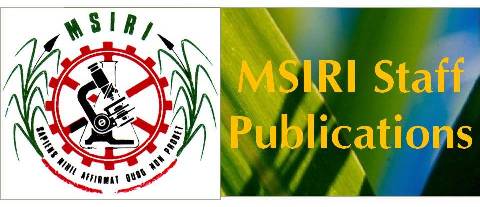Soil quality changes caused by sugarcane cultivation in a sub-humid inceptisol of Mauritius
| MSI05P4121 | |
| Ng Cheong, R. Ng Kee Kwong, K. F. Ah Koon, P. D. Du Preez, C. C. | |
| Soil quality changes caused by sugarcane cultivation in a sub-humid inceptisol of Mauritius | |
| periodical article | |
| 2005 | |
| Proc. int. Soc. Sug. Cane Technol. | |
| 25 (2): 50-53 | |
| En | |
| En Fr Sp | |
| Yield decline in sugarcane monoculture in countries such as Australia and South Africa has been attributed to a degradation in soil quality. As information on the long-term impact of sugarcane monoculture on soils of Mauritius is lacking, a study was initiated to determine the effects of sugarcane cultivation on the different parameters constituting soil quality. The study was conducted in an irrigated Ustic Eutropept receiving less than 800 mm rainfall annually. Fields under natural vegetation were compared to non-mechanised fields cultivated with sugarcane for less than 25 and more than 50 yrs. The same soil in the area which had undergone extensive derocking and land grading to make mechanised cultural practices possible was also sampled, analysed and compared to non-mechanised sugarcane fields. Bulk denisity and stabilised infiltration rates were measured in situ, while pH, organic carbon and total nitrogen contents, and soil aggregate properties were determined in the laboratory. The greatest changes in soil quality were noted in the upper 15cm layer, with sugarcane cultivation leading to an increase in pH, bulk density, infiltration rate and aggregate size when compared to natural condition. Conversely, a marked decrease in organic carbon and total nitrogen contents was noted. With derocking and land grading, an increase in bulk density and in aggregate size and a decrease in infiltration rate were observed. However, little effect on soil chemical properties, such as pH, was found. Thus, sugarcane cultivation by itself does not seem to have a detrimental effect on soil quality. Instead, its effects can be positive, through an increase in pH and improved infiltration caused by a larger number of dmacroposeres associated with tillage and cane root growth. Extensive land grading and derocking was, on the other hand, shown to have detrimental effects on soil quality, since the soil became more compact and less permeable. The general conclusion from this work is that the overall management of the fields is becoming more difficult and should be aimed towards restoring soil quality to ensure a sustainable sugarcane production. | |
| Sugarcane sugarcane soils soil quality land grading bulk density infiltration rate organic matter aggregate size | |
| Mauritius | |
| Sugarcane: Soils and plant nutrition | |
| Soils | |
| 2005-02-11 | |
| en | |
| LIB | |
| CAT | |
| CHEM Irrig |
